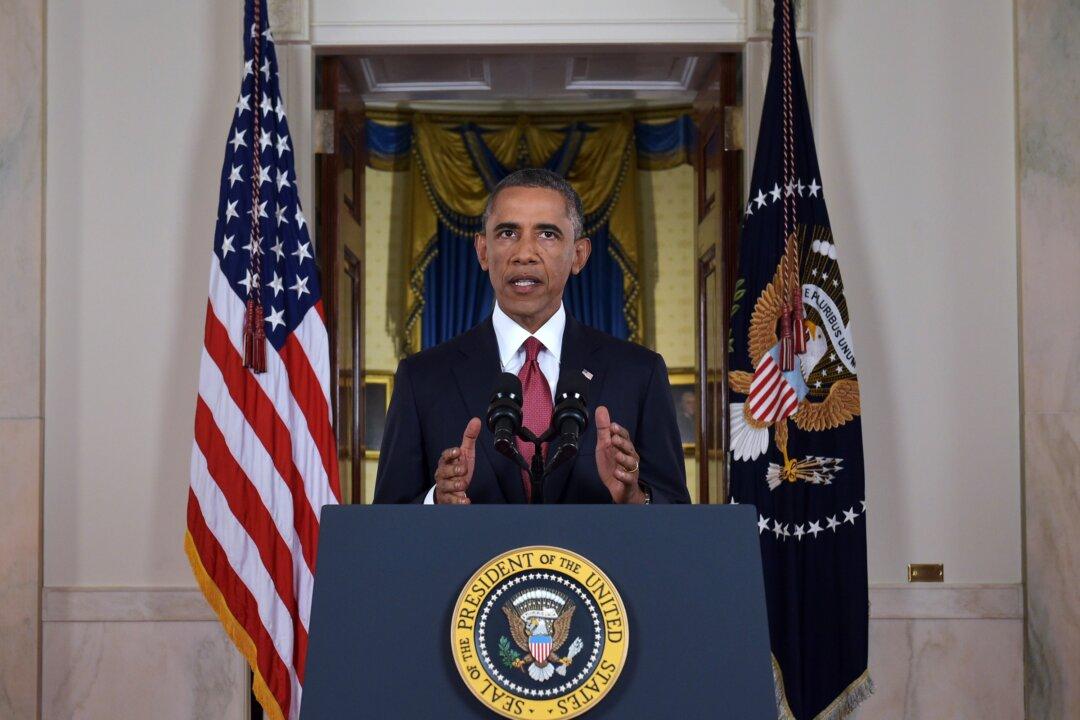On the eve of the 13th anniversary of the 9/11 attacks, the president outlined his long-awaited plan to “degrade and destroy the terrorist group Islamic State.”
“We stand for freedom, for justice, for dignity,” said President Barack Obama.
The United States will give air support to Iraqi troops in Iraq. Obama said, he “will not hesitate to take action against ISIL in Syria.”
“My highest priority is the security of the American people. We took out Osama bin Laden,” and took the fight to the terrorists, said Obama. In the same way, he plans to take the fight to ISIL, he said.
“Small groups of terrorists have the capacity to do great harm,” he said.
Killing Innocents
Obama said the Islamic State is not Islamic, because no religion condones the killing of innocents.
He voted against the invasion of Iraq when he was a senator, and he campaigned for president on a promise to being the troops home from Afghanistan and Iraq. On Wednesday, the president said “American power can make a decisive difference,” but it cannot do for other countries what they should do for themselves.

He does plan to send more military advisers to Iraq, but will not commit ground troops to combat. “We will send an additional 475 service members to Iraq, ” he said.
America will conduct a systematic campaign of air strikes to support Iraqi troops, said Obama. He advanced as a core principal, “If you attack America you will find no safe haven.”
Assad’s regime will never regain legitimacy, and so the American plan is to strengthen the opposition in Syria, said Obama.
He said he has the authority to act, but welcomes congressional support to show the world that America is united in combating the threat of ISIL.
Not What He Wanted
The strategy enunciated by Obama, involving deeper U.S. military involvement, is a reversal from what he had wanted to do when he was elected.
Obama has steadfastly sought to wind down American military campaigns in the Middle East and avoid new wars. That stance has been notable in Syria, where Islamic State militants have taken advantage of the instability created by a three-year civil war and now operate freely in areas near and across the Iraqi border.
Closer to home, U.S. officials fear that Westerners who have joined the militant group could return to their own countries and launch attacks.
Earlier this summer, Iraq’s government asked the United States for help in confronting the militants, and Obama approved airstrikes within Iraq’s borders.
He may now authorize strikes in Syria as well and has told people briefed on the White House plans in recent days that the U.S. must view the Islamic State as one group, not two separate entities split by a border.
Separately, the White House announced Wednesday that it was providing $25 million in immediate military assistance to the Iraqi government as part of efforts to combat the Islamic State.
Arms to Syrian Opposition
Adamantly opposed to putting American combat troops on the ground, Obama will call for increased training of Iraqi security forces and the provision of arms shipments to vetted Syrian opposition fighters in order to help both groups in their fight against the militants.
Some of Obama’s own advisers, including former Secretary of State Hillary Rodham Clinton, pressed him to arm the rebels early in their fight against Syrian President Bashar Assad. But Obama resisted, arguing that there was too much uncertainty about the composition of the rebel forces. He also expressed concern about adding more firepower to an already bloody civil war.
The president eventually approved a small CIA-run program to arm the rebels, but the effort he now seeks is broader and would be run by the Pentagon in countries near Syria’s borders. Obama asked Congress for approval of such a program earlier this year, but the plan stalled on Capitol Hill.
The Associated Press contributed to this report.





